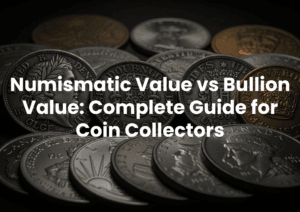Buying gold coins becomes straightforward when you know what to look for. The right approach saves money and prevents problems.
These steps help you make secure gold coin purchases that protect your investment.
Why Gold Coin Safety Matters
Buying gold coins safely protects against three main risks: counterfeits, overpriced premiums, and shipping problems.
The gold market attracts scammers who target inexperienced buyers. One collector bought “American Eagles” far below market value online. The coins were gold-plated fakes worth nothing.
Simple precautions save thousands of dollars. A few checks protect your investment from common traps.
Finding Reputable Dealers
Choosing established, trustworthy dealers determines whether you have a smooth transaction or costly headaches.
Quality dealers offer:
- BBB accreditation with years of experience
- Physical addresses and responsive service
- Clear return policies and authenticity guarantees
- Transparent pricing
Warning signs include:
- Prices far below market rates
- High-pressure sales tactics
- Vague contact information
- Untraceable payment requirements
Start with modest test orders from new dealers. Experience their service before larger purchases. This approach prevents expensive mistakes.
Understanding Fair Pricing
Gold coin premiums vary by type, dealer, and market conditions. Knowing typical ranges prevents overpaying.
American Gold Eagles and Buffalos carry slightly higher premiums than Canadian Maples and Krugerrands. Popular coins command more but offer better liquidity.
Checking Current Prices
Check current spot prices before purchasing. GR Reserve and dealer sites show real-time pricing that provides your baseline for evaluating quotes.
Dealers charging well above normal premiums need good explanations. Prices far below market rates often signal counterfeits.
Secure Payment Methods
Payment methods affect both security and total cost. Reputable dealers provide multiple options with different advantages.
Wire transfers and ACH payments save money versus credit cards. Cashier’s checks work well for larger purchases. Personal checks suit smaller amounts but require longer processing.
Credit cards cost more through processing fees but offer buyer protection. The extra expense helps first-time buyers or when testing new dealers.
Payment Methods to Avoid
Avoid cash-only dealers, gift card payments, and cryptocurrency with unknown sellers. Money orders and wire services lack protection. Smart buyers balance security with reasonable fees.
Safe Delivery Procedures
Proper delivery procedures protect investments from loss or theft.
Packages must require signatures to protect both parties if items disappear. Legitimate dealers use plain boxes without logos that attract thieves.
Inspection and Documentation
Open packages immediately upon delivery. Check contents against your order and photograph everything. All shipments need full insurance and tracking.
Contact dealers immediately about damaged packaging, missing items, or incorrect orders. Documentation protects your investment.
Authentication Steps You Can Take
Basic gold coin authentication prevents counterfeits and builds purchasing confidence.
Real gold never sticks to magnets. Compare coin weights to published specifications using gram scales. Examine details, fonts, and coloring for consistency.
When Professional Testing Helps
Professional testing makes sense for high-value purchases, vintage coins, or rare pieces. Local coin dealers and precious metals specialists provide authentication and grading services.
Sophisticated counterfeits exist for popular coins like American Eagles. Testing and grading fees provide valuable peace of mind when basic checks raise concerns.
Making Your First Purchase
Safe gold coin buying follows clear principles. Choose established dealers, pay fair premiums, use secure payments, and authenticate purchases.
American Eagles and Canadian Maples offer excellent liquidity and recognition for beginners. Taking time with first purchases develops skills for successful physical gold investing.
Frequently Asked Questions
What’s the difference between gold bars and coins?
Gold bars offer lower premiums (2-4% over spot) but coins provide better liquidity and recognition. Coins work better for beginners and smaller investments.
Can I store gold coins at home?
Yes, but ensure you have a quality safe, adequate insurance coverage, and consider security risks compared to professional storage options.
How are gold investments taxed?
Physical gold coins are taxed as collectibles with capital gains rates up to 28%, higher than typical investment assets like stocks.
How do I know if my dealer is legitimate?
Check their BBB rating, verify physical address, read customer reviews, and start with small test purchases. Legitimate dealers provide clear contact information and transparent policies.
What happens if my coins are lost in shipping?
Reputable dealers fully insure shipments and work with you to resolve any losses. This is why choosing established dealers with good track records matters.



